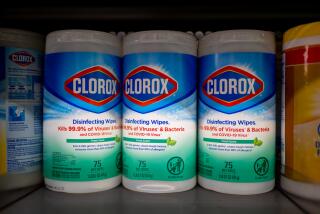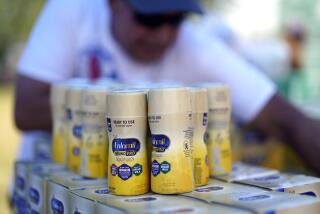Chiron’s Flu Vaccine Woes Infecting Others
- Share via
When Chiron Corp. sneezed Tuesday, businesses throughout the healthcare industry -- and beyond -- caught cold. But others may get a shot in the arm this flu season.
Chiron slashed its profit forecast by more than half after British health officials suspended production at the company’s Liverpool plant, blocking shipment of some 48 million doses of its Fluvirin vaccine -- almost half the expected U.S. supply. Chiron shares plunged 16%, or $7.44, to $37.98 on Nasdaq.
The fallout spread well beyond Emeryville, Calif.-based Chiron. Novartis, the Swiss drug maker that has a 40% stake in Chiron, slipped 22 cents to $46.60, while Henry Schein Inc., a New York-based distributor of Fluvirin, lowered its 2004 profit forecast to $3.01 to $3.07 a share from as much as $3.61 in August.
“This has much broader implications than just Chiron having a bad day,” said Darren Lehrich, an analyst with Piper Jaffray & Co.
Indeed, employers of all kinds face the possibility this flu season of higher absenteeism because the government has recommended that shots first go to people at high risk, such as infants and the elderly, according to the Society for Human Resource Management.
The fallout Tuesday wasn’t all negative, however. In anticipation of heavier demand for its Tamiflu prescription antiviral treatment, Roche Pharmaceuticals said it would step up production. And shares of MedImmune Inc. gained almost 6% on anticipation that its nasal spray flu vaccine would enjoy a banner season.
Medical lab companies and makers of flu diagnostic tests could similarly see gains in the months ahead, analysts said, and hospital companies could benefit from a rise in patient volume in the fourth quarter.
Chiron, which was founded in 1981 by three college professors and employs 5,300, makes four influenza vaccines. Its Fluvirin, which was affected by the Liverpool production problem, is the top seller in Northern Europe and No. 2 in the U.S. after the flu vaccine marketed by Aventis Pasteur, a French pharmaceutical company. Chiron also makes Fluvirin in Italy and Germany, but those lots have been committed elsewhere.
Analysts and consultants said the effect on Chiron could be long-lasting. Flu vaccine customers are most concerned about reliability, and failing to deliver could make it very hard for Chiron to sign them up next year, said David Webster, whose Webster Consulting Group advises health firms.
Indeed, analysts were speculating that Chiron could encounter problems with vaccine deliveries in 2005, although Chiron Chief Executive Howard Pien said the company was “committed to take all necessary actions to ensure an adequate vaccine supply” next year.
Chiron cut its 2004 profit forecast from $1.50 to $1.60 a share to 35 to 45 cents a share. The company reported 2003 profit of $227 million, or $1.19 a share, on sales of $1.8 billion -- including $245 million from Fluvirin. That was the first year Chiron sold Fluvirin, the vaccine it acquired when it bought PowderJect Pharmaceuticals for about $878 million.
Sanford Bernstein analyst Geoffrey Porges said the debacle would raise credibility issues for Chiron’s management, although he said the company, which also markets blood tests, should eventually recover.
“In the short run, it will take a hit,” he said. “But value-oriented investors are going to start looking closely at the stock.”
Shares of Aventis rose $1.18 to $86 on the New York Stock Exchange. But it has said the earliest it could make more flu vaccine was after November.
“Many people might think that this is a good thing for ... Aventis, but actually it’s not,” Webster said. “All manufacturers get tarred with the same brush.”
He said the Chiron problem would put pressure on federal officials to line up additional suppliers of flu vaccine, “so Aventis might be facing a couple of new, additional competitors in the next year or so.”
That notion buoyed shares of Canadian firm ID Biomedical Corp., which supplies flu vaccine there. ID’s shares jumped about 6% on Tuesday.
Vaccine makers also will have to work harder next year to convince people that they should get shots and that the supply will be there, Webster said.
The problems at Chiron, he said, aren’t “going to help grow the market or help get people more immunized.”
*
Associated Press was used in compiling this report.
More to Read
Inside the business of entertainment
The Wide Shot brings you news, analysis and insights on everything from streaming wars to production — and what it all means for the future.
You may occasionally receive promotional content from the Los Angeles Times.











